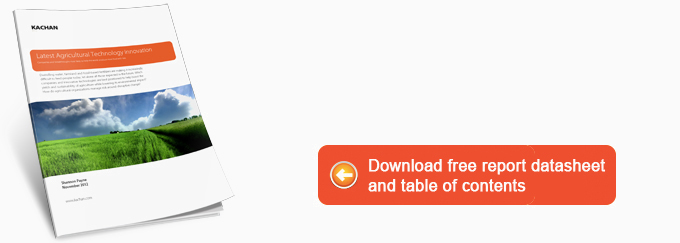Dwindling water, farmland and fossil-based fertilizers are making it increasingly difficult to feed people today, let alone all those expected in the future. Which companies and innovative technologies are best positioned to help boost the yields and sustainability of agriculture while lowering its environmental impact? How should organizations prepare to manage risk around disruptive agricultural industry change?
Latest Agricultural Technology Innovation
Companies and breakthroughs most likely to help the world produce more food with less
A report by Kachan & Co., November 2012.
Dwindling water, farmland and fossil-based fertilizers are making it increasingly difficult to feed people today, let alone those expected in the future.
Select companies are poised to reinvigorate large scale agriculture with cleantech innovations that help expand yields, increase efficiencies, reduce waste and address concerns about toxicity, safety and the environment.
How do established organizations manage risk around the disruptive change of breakthrough new agricultural innovation? Which new agriculture companies stand the best chances of success? Why?
In its report on new agricultural cleantech, Kachan offers definitions and identifies drivers, and then critically examines 57 companies with important emerging technologies in bio-based fertilizers, pesticides and fungicides, microirrigation, precision agriculture, acquaculture, vertical farming, waste management and more.
The report concludes with recommendations for investors, large corporations, policy makers and entrepreneurs.
Report essential for
- Companies across the agricultural value chain, from small technology developers to large multinationals
- Investors seeking disruptive innovation
- Service providers seeking promising agricultural technology companies as clients
- Governments
- And others
Methodology
Kachan & Co. conducted more than 32 interviews with leading vendors, consulting scientists, associations, government bodies and others, and synthesized secondary research for this report over a four month period. One company's facilities were toured. Research uncovered many details about select companies' agricultural technologies, and their latest research and funding statuses, not available anywhere else. 57 companies are profiled in the report.
Technologies investigated
Crop farming (natural fertilizers and amendments, biological control of weeds, pest and disease, precision irrigation and fertilization, land management, biotechnology, tools and equipment, waste innovations and transport decay prevention), controlled environment agriculture (hydroponics, aeroponics and vertical farming and improved greenhouses), sustainable forestry, animal farming waste innovations and aquaculture (health and yield, containment and waste innovations).
DOWNLOAD FREE DATASHEET AND TABLE OF CONTENTS OF KACHAN'S AGRICULTURAL TECHNOLOGY REPORT
ENTER YOUR INFORMATION BELOW.
"Increased [clean agricultural technology] investment is expected as our understanding of what truly constitutes sustainable agriculture evolves."
-From the report


